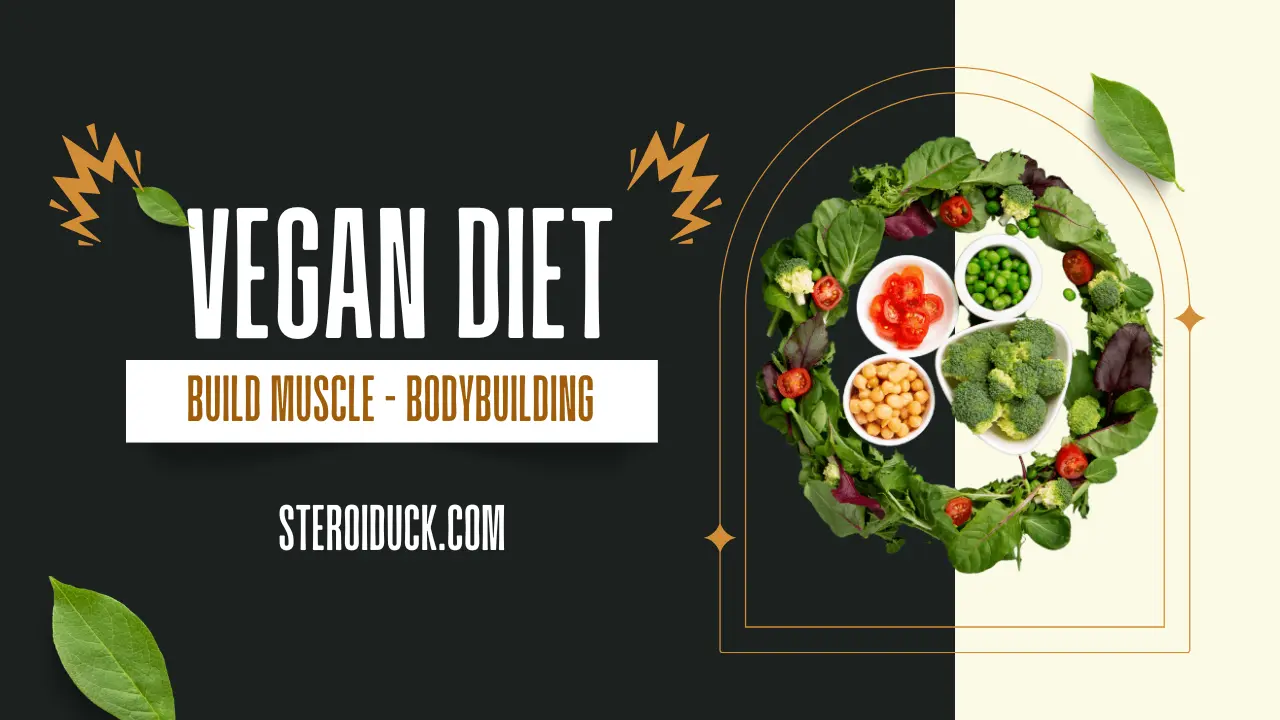Last Updated on January 3, 2025
The vegan bodybuilding diet has gained popularity as more athletes seek to build muscle without relying on animal products. This approach combines plant-based nutrition with strength training to support muscle growth and overall fitness. Vegan bodybuilders face unique challenges in meeting their nutritional needs, but with careful planning, they can achieve impressive results.
This article explores the key components of a successful vegan bodybuilding diet. It covers essential macro-nutrients and micro-nutrients, meal planning strategies, and supplement considerations for plant-based athletes. By understanding these elements, vegan bodybuilders can optimize their nutrition to support muscle gain and recovery while adhering to their ethical dietary choices.
Essential Macro-nutrients for Vegan Bodybuilders
Vegan bodybuilders need to pay careful attention to their macro-nutrient intake to support muscle growth and recovery. The three main macro-nutrients – protein, carbohydrates, and fats – play crucial roles in a vegan bodybuilding diet.
Protein sources and requirements
Protein has an influence on muscle growth and repair, making it a vital component of any bodybuilding diet. For vegan bodybuilders, meeting protein requirements can be challenging but achievable. Research suggests that bodybuilders should aim for 1.6 to 2.2 grams of protein per kilogram of body weight daily to optimize muscle gains.
Plant-based protein sources for vegan bodybuilders include:
- Legumes (beans, lentils, chickpeas)
- Tofu and tempeh
- Seitan (wheat gluten)
- Quinoa
- Nuts and seeds
- Plant-based protein powders (pea, rice, hemp)
To ensure a complete amino acid profile, it’s important to consume a variety of protein sources throughout the day. Combining different plant proteins, such as beans with rice, can help to create complete proteins.
Carbohydrates for energy and recovery
Carbohydrates are the primary fuel source for intense workouts and have an impact on muscle glycogen replenishment. Vegan diets tend to be naturally high in carbohydrates, which can be beneficial for bodybuilders. Aim for 5-7 grams of carbohydrates per kilogram of body weight daily to support muscle growth and recovery .
Excellent vegan sources of carbohydrates include:
- Whole grains (oats, brown rice, quinoa)
- Sweet potatoes and yams
- Fruits
- Legumes
These foods not only provide energy but also contain essential vitamins, minerals, and fiber.
Healthy fats for hormone production
While often overlooked, fats have a crucial role in hormone production, including testosterone, which has an influence on muscle growth. Vegan bodybuilders should aim for 20-30% of their daily calories from healthy fat sources .
Good vegan sources of healthy fats include:
- Avocados
- Nuts and seeds (almonds, walnuts, chia seeds, flaxseeds)
- Olive oil
- Coconut oil
These fats also help with the absorption of fat-soluble vitamins and provide sustained energy throughout the day.
By carefully planning their macronutrient intake, vegan bodybuilders can create a diet that supports muscle growth, recovery, and overall health. It’s essential to consume a variety of plant-based foods to ensure all nutritional needs are met. With proper attention to protein, carbohydrates, and fats, vegan bodybuilders can achieve their muscle-building goals while adhering to their ethical dietary choices.
Key Micro-nutrients to Prioritize
While macro-nutrients form the foundation of a vegan bodybuilding diet, micro-nutrients play a crucial role in supporting overall health and muscle growth. Vegan athletes need to pay special attention to certain key micro-nutrients to ensure optimal performance and recovery.
Iron for oxygen transport
Iron has a significant influence on oxygen transport throughout the body, making it essential for vegan bodybuilders. This mineral is a core component of hemoglobin, the protein responsible for carrying oxygen in red blood cells. Adequate iron intake has an impact on energy production, muscle function, and overall athletic performance.
Vegan athletes may need to consume more iron than their omnivorous counterparts due to the lower absorption rate of non-heme iron found in plant sources. To meet their iron needs, vegan bodybuilders should focus on incorporating iron-rich plant foods into their diet. Some excellent vegan sources of iron include:
- Legumes (beans, lentils, chickpeas)
- Tofu and tempeh
- Dark leafy greens (spinach, kale)
- Quinoa
- Pumpkin seeds
- Dried fruits (apricots, raisins)
To enhance iron absorption, it’s beneficial to consume iron-rich foods alongside vitamin C sources, such as citrus fruits, bell peppers, or broccoli. This combination has an influence on improving the body’s ability to absorb non-heme iron from plant sources.
Vitamin B12 for nerve function
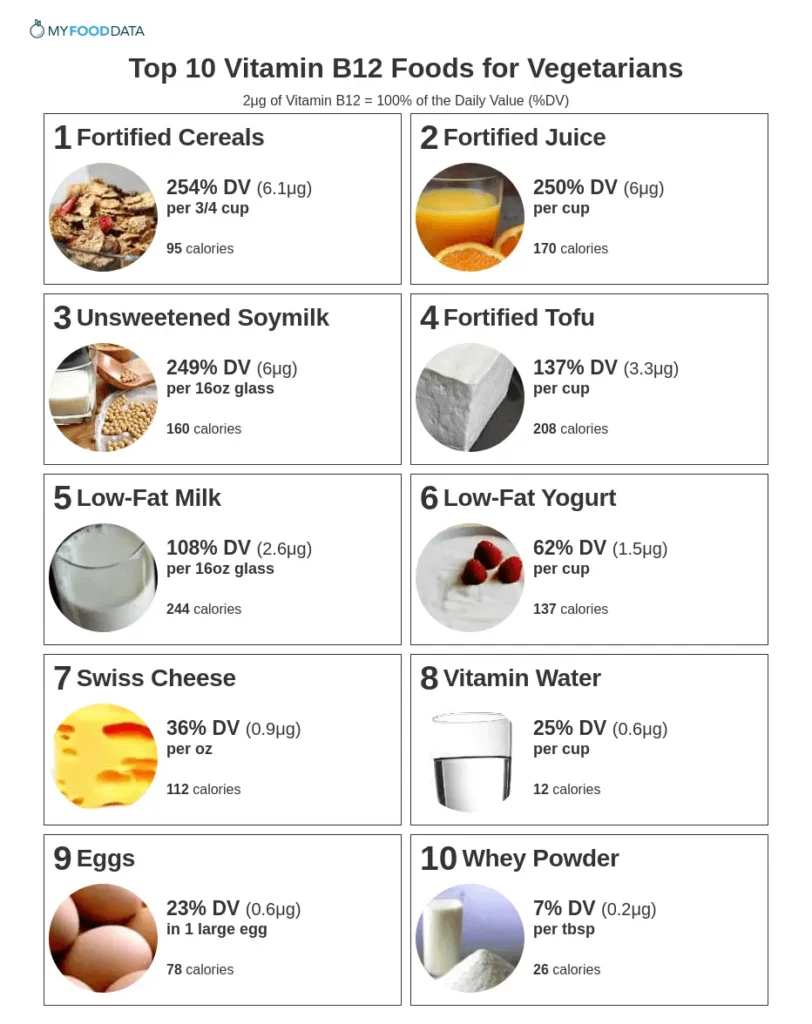
Vitamin B12 is crucial for nerve function, DNA synthesis, and the formation of red blood cells. It’s particularly important for vegan bodybuilders to prioritize B12 intake, as this vitamin is naturally found only in animal products. A deficiency in B12 can have a significant impact on energy levels, muscle function, and overall health.
To ensure adequate B12 intake, vegan bodybuilders should consider the following options:
- Consume B12-fortified foods, such as plant milk, breakfast cereals, and nutritional yeast.
- Take a B12 supplement daily, providing at least 10 micrograms, or a weekly supplement providing 2000 micrograms.
Calcium for muscle contraction
Calcium plays a vital role in muscle contraction, nerve signaling, and bone health. While dairy products are often associated with calcium, vegan bodybuilders can obtain this essential mineral from plant-based sources. Adequate calcium intake has an influence on muscle function, recovery, and overall bone strength.
Some excellent vegan sources of calcium include:
- Fortified plant milk (such as almond, soy, or oat milk)
- Tofu (calcium-set)
- Leafy greens (kale, collard greens, bok choy)
- Sesame seeds and tahini
- Almonds and almond butter
To optimize calcium absorption, vegan bodybuilders should ensure they’re getting enough vitamin D, either through sun exposure or supplementation. Additionally, consuming calcium-rich foods throughout the day, rather than in one large dose, can help improve absorption and utilization.
Meal Planning and Timing for Muscle Growth
Effective meal planning and timing are crucial components of a successful vegan bodybuilding diet. By strategically consuming the right nutrients at optimal times, athletes can enhance their performance, support muscle growth, and accelerate recovery.
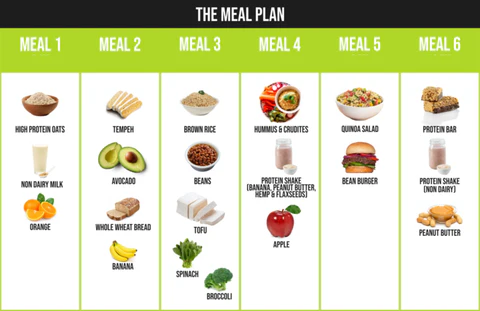
Pre and post-workout nutrition
Pre-workout nutrition plays a vital role in fueling the body for intense training sessions. Consuming a meal rich in carbohydrates and protein 60-90 minutes before exercise can provide sustained energy and support muscle preservation. Vegan bodybuilders can opt for a combination of low-glycemic index carbohydrates and plant-based proteins to optimize their pre-workout meal. Some excellent options include oatmeal with fruit and a scoop of vegan protein powder, or a whole grain toast with almond butter and banana.
Post-workout nutrition is equally important for muscle recovery and growth. Consuming a meal containing both carbohydrates and protein within 30-60 minutes after training can help replenish glycogen stores and stimulate muscle protein synthesis. A protein shake made with plant-based protein powder and a piece of fruit can be an effective post-workout snack. Alternatively, a more substantial meal like a quinoa bowl with tofu, vegetables, and legumes can provide a balanced mix of nutrients for recovery .
Meal frequency and portion sizes
To support muscle growth and maintain a steady supply of nutrients, vegan bodybuilders should aim to consume multiple meals throughout the day. Eating every 3-4 hours, for a total of 5-6 meals per day, can help maintain stable blood sugar levels and provide a consistent flow of amino acids to the muscles .
Portion sizes should be adjusted based on individual calorie and macronutrient needs. A general guideline is to include a source of protein, complex carbohydrates, and healthy fats in each meal. For example, a typical meal might consist of 1/2 cup of cooked quinoa, 1 cup of mixed vegetables, 3-4 ounces of tempeh or tofu, and a tablespoon of olive oil or avocado.
Balancing macros throughout the day
Balancing macronutrients throughout the day has an influence on overall energy levels and muscle growth. Vegan bodybuilders should aim to distribute their protein intake evenly across meals, with each meal containing approximately 20-40 grams of protein. This approach has an impact on maintaining a positive nitrogen balance and supporting continuous muscle protein synthesis .
Carbohydrate intake can be adjusted based on training schedules and individual goals. Higher carbohydrate meals are beneficial before and after workouts to provide energy and aid in recovery. On rest days or during periods of lower activity, carbohydrate intake can be slightly reduced while maintaining adequate protein and healthy fat consumption.
Incorporating a variety of plant-based protein sources throughout the day, such as legumes, tofu, tempeh, seitan, and vegan protein powders, can help ensure a complete amino acid profile. Combining different protein sources, like beans with rice or hummus with whole grain bread, can also enhance the overall protein quality of meals.
By carefully planning meal timing and composition, vegan bodybuilders can optimize their nutrition to support muscle growth, enhance recovery, and achieve their fitness goals while adhering to a plant-based lifestyle.
Supplements to Consider on a Vegan Bodybuilding Diet
Protein powders
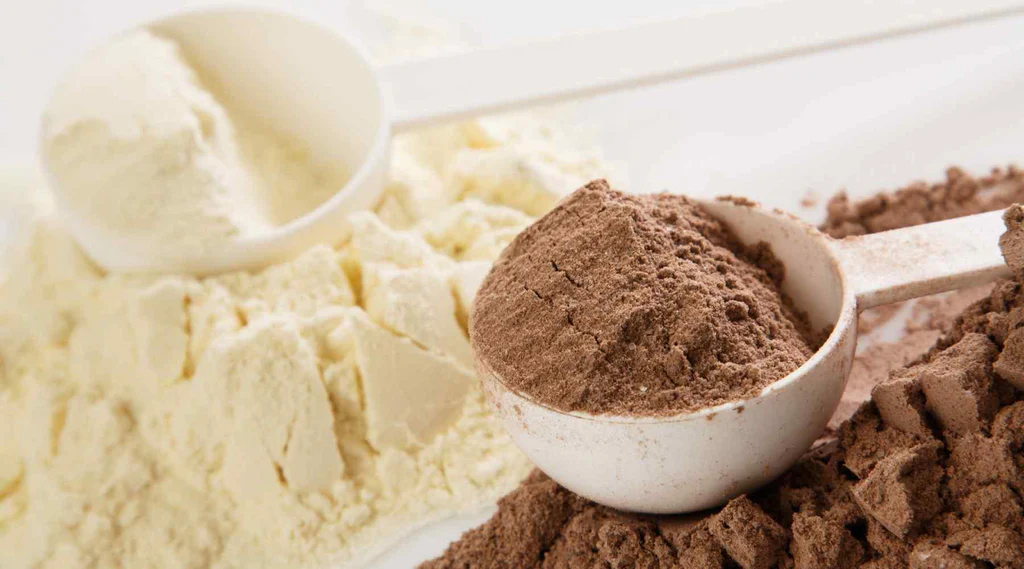
Vegan protein powders are essential supplements for plant-based athletes looking to build muscle. These powders provide a concentrated source of protein, which is crucial for muscle recovery and growth. Many vegan protein powders offer a complete amino acid profile, making them comparable to whey protein in terms of effectiveness for muscle building.
When choosing a vegan protein powder, look for options that contain at least 20 grams of protein per serving. Pea protein, rice protein, and hemp protein are popular choices that provide a good balance of essential amino acids. Some brands offer blends of different plant proteins to create a more comprehensive amino acid profile.
For those concerned about taste, many vegan protein powders now come in a variety of flavors and mix well with plant-based milk or water. It’s important to choose a powder that not only meets your nutritional needs but also tastes good, as this will encourage consistent use.
Creatine
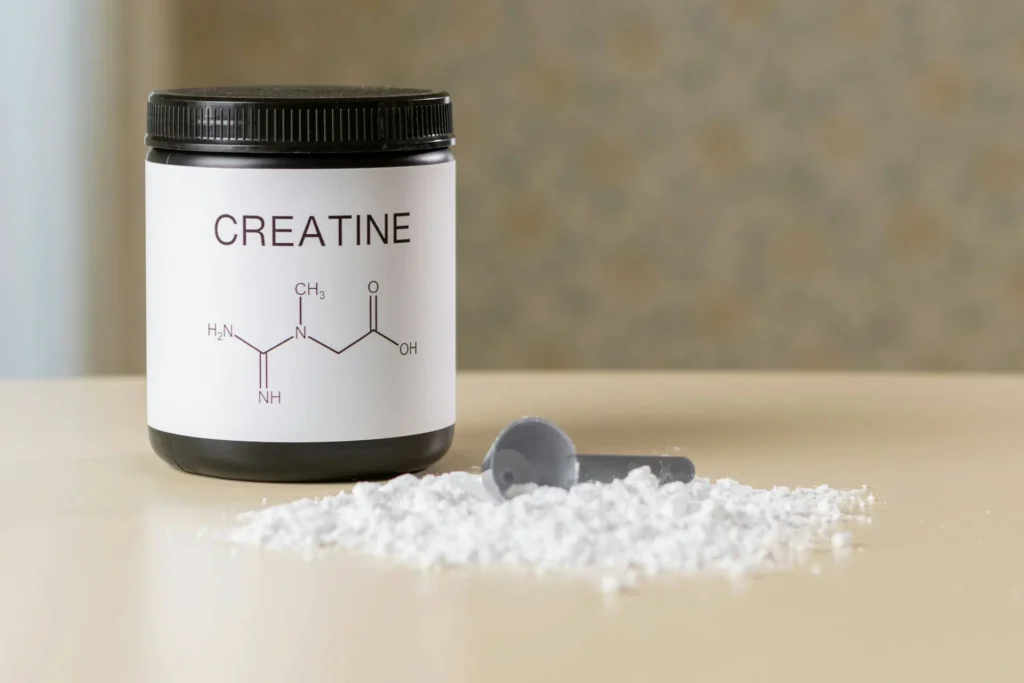
Creatine is a popular supplement among bodybuilders, and it’s equally beneficial for vegan athletes. This compound plays a crucial role in producing energy for short-duration, high-intensity activities like weightlifting. Creatine supplementation can help improve exercise performance, increase muscle mass, and enhance recovery.
Most creatine supplements are vegan-friendly, as they are typically synthesized from non-animal sources. The recommended dosage is usually 3-5 grams per day, and it’s best taken consistently to maintain muscle saturation levels. Some studies have shown that vegetarians and vegans may benefit even more from creatine supplementation, as their dietary intake is typically lower than that of meat-eaters.
Omega-3 fatty acids
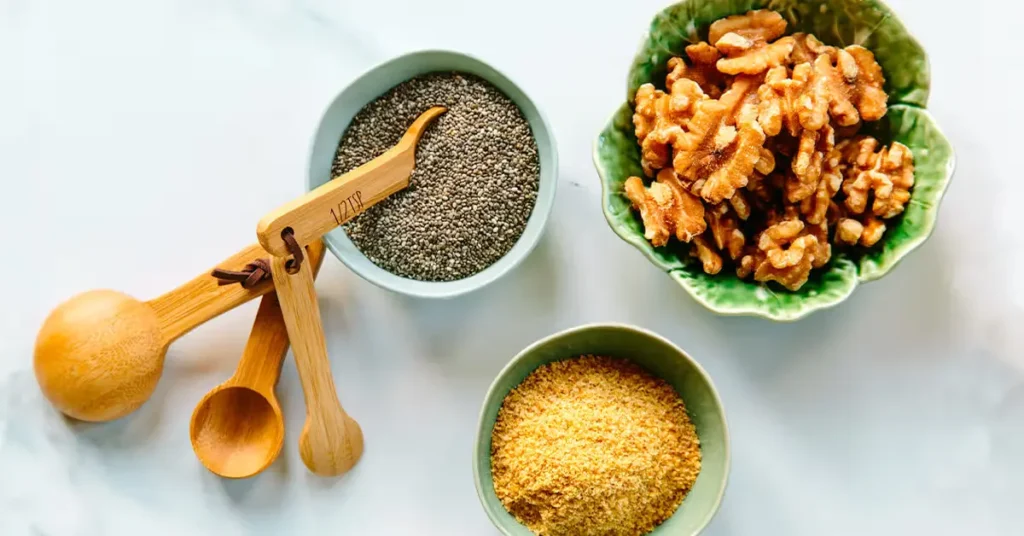
Omega-3 fatty acids are essential for overall health and can be particularly beneficial for athletes. These healthy fats have anti-inflammatory properties and may help with muscle recovery and joint health. While fish oil is a common source of omega-3s, vegan athletes can opt for plant-based alternatives.
Algal oil supplements are an excellent vegan source of DHA and EPA, the two most important types of omega-3 fatty acids. These supplements are derived from algae and provide the same benefits as fish oil without any animal products. Alternatively, vegan bodybuilders can incorporate omega-3-rich foods into their diet, such as flaxseeds, chia seeds, and walnuts.
By including these supplements in their regimen, vegan bodybuilders can support their muscle-building goals and overall health while adhering to a plant-based lifestyle. It’s important to remember that supplements should complement a well-planned vegan bodybuilding diet and not replace whole foods. Always consult with a healthcare professional or registered dietitian before starting any new supplement routine.
In Summary
The vegan bodybuilding diet has shown itself to be a viable and effective approach to build muscle without relying on animal products. By carefully planning macronutrient and micronutrient intake, optimizing meal timing, and considering targeted supplements, plant-based athletes can achieve impressive muscle gains while sticking to their ethical dietary choices. This approach not only supports physical performance but also has an influence on overall health and well-being.
As the popularity of vegan bodybuilding continues to grow, it’s likely we’ll see more research and innovations in plant-based nutrition for athletes. This ongoing development has an impact on breaking down barriers and misconceptions about vegan diets and athletic performance. With the right knowledge and dedication, vegan bodybuilders can thrive and compete at the highest levels, proving that you don’t need meat to build a strong, muscular physique.
FAQs
Author

Dr. Grant Fourie
Hi, I’m Dr. Grant Fourie, a dedicated medical professional passionate about advancing healthcare in our community. With 20+ years' of medical background, I strive to provide compassionate and innovative care to my patients. Outside the clinic, I enjoy sport and fitness hobbies, which keep me balanced and inspired.


